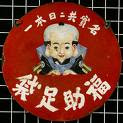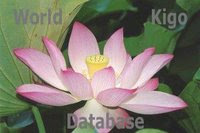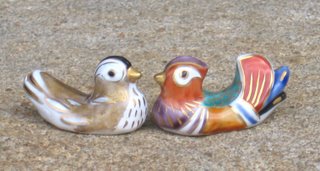. Fuku no Kami Legends 福の神 .
:::::::::::::::::::::::::::::::::::::::::::::::::::::::::::::::::::::::::::::::::::::::::::::::::::::
Fukusuke 福助だるま

He is almost like a god, helping people to make good business.
It is the figure of a man seated on his knees on a cushion, with a big round shaven head.
The origin was a god of good luck (fuku no kami 福の神)
called Kanoo Fukusuke 叶福助 in Edo.
. . . CLICK here for Kano Fukusuke Photos !
Fukusuke would grant a wish (kanoo, kanaeru 叶える) and was popular with the tea shops and courtisans.
睦まじう夫婦仲よく見る品は不老富貴に叶う福助
Fukusuke would also bring long life and prosperity to a loving couple.
A model was probably the farmer Sataro from Settsu province 摂津国西成郡安部里の佐太郎 in 1802, who did not only live long but was of a small body with a large head (probably from a disease) and often the aim of people's laughter. He went off to Edo for a better life, got caught by a dealer (in human beings) near Odawara and was made a showpiece in a curio show in Kamakura, and later brought to Edo.
A disabled person was a fugu suke ふぐ【不具】, later read as Fukusuke, FUKU being a pun with "good luck".
A certain noble Hatamoto bought Fukusuke from his owner for 30 ryo of gold and gave him to his daughter as a playmate. The new owner family prospered and Fukusuke was able to marry the servant of the home, Risa りさ.
They started a small shop in Nagai-Cho and sold Fukakusa yaki 深草焼 pottery. He even made dolls of his own figure and sold them for good luck items.
Well, that is quite a story of a long, eventfull life of a disabled person!
 The original might also have been a merchant of Kyoto during the Edo period, who sold cloths.
The original might also have been a merchant of Kyoto during the Edo period, who sold cloths.His ears are quite big (fukumimi).
His wife is O-Fuku (Ofuku お福、O-Tafuku, Otafukuお多福) and his dauther is a Fukumusume 福娘. (but only in the curio shops).
He sits at the entrance of the store and welcomes visitors with a deep bow.
おじぎ福助 ojigi Fukusuke

Gott der Händler. Puppe mit großem Kopf.
.......................................................................

Fukusuke from Hirado pottery 福助 平戸

Yabase clay doll, Akita 八橋人形
.......................................................................
. Daruma Museum
Fukakusa-yaki 深草焼, Clay Dolls from Fukakusa

To our day, there is a store in Tokyo selling tabi socks with a big toe.
Tsujimoto Fukumatsu established the Fukusuke Tabi company in 1885.
English Reference Fukusuke Tabi
Fukusuke is also the name of a type of chrysanthemum
Fukusukegiku 福助菊
. . . CLICK here for Photos !
:::::::::::::::::::::::::::::::::::::::::::::::::::::::::::::::::::::::::::::::::::::::::::::::::::::
Fukusuke with a family crest of radishes

Click for more auspicious FUKUSUKE photos !
:::::::::::::::::::::::::::::::::::::::::::::::::::::::::::::::::::::::::::::::::::::::::::::::::::::
Fukusuke as a baby
like a Daruma Doll

Daruma Museum : Otafuku, O-Fuku Daruma
お多福だるま、お福達磨, お福だるま

fuufu Fukusuke 夫婦福助 the couple of Fukusuke and his wife
Sendai hariko 仙台張子 papermachee dolls from Sendai
Fukusuke, Daruma and
other auspicious items for the New Year

:::::::::::::::::::::::::::::::::::::::::::::::::::::::::::::::::::::::::::::::::::::::::::::::::::::

Fukusuke on a spring horse 春駒持ち福助
© PHOTO : Nakamura Sakuo
© Reference
:::::::::::::::::::::::::::::::::::::::::::::::::::::::::::::::::::::::::::::::::::::::::::::::::::

福助のお辞儀は永遠に雪が降る
Fukusuke no o-jigi wa eien ni yuki ga furu
the servile bow of Fukusuke
is with us for ever . . .
it is snowing
鳥居真理子 Torii Mariko (Torii) (1948 - )
. WKD : Gendai . Modern Haiku
:::::::::::::::::::::::::::::::::::::::::::::::::::::::::::::::::::::::::::::::::::::::::::::::::::

source : zenmaitarow
Fukusuke and O-Tafuku as kokeshi 福助 - お福こけし
:::::::::::::::::::::::::::::::::::::::::::::::::::::::::::::::::::::::::::::::::::::::::::::::::::::
fuku no kami 福の神 god of good luck

source : ameblo.jp/shigeoh14
Maybe the most popular are Ebisu and his companion Daikoku
. Ebisu えびす 恵比寿 .
Hotei, one of the "seven gods of good luck" is another great candidate
. Hotei 布袋 Pu-Tai .
A red Daruma doll is also seen as
"always happy to brind good luck to the family
いつも明 AKAるい 家庭に宿る福の神
. Daruma Dolls in 10 colors / カラーだるま .
.......................................................................
小柱や己が夜寒の福の神
ko-bashira ya ono ga yozamu no fuku no kami
small post,
you're my god of luck
this cold fall night
Tr. Chris Drake
This hokku is from the eighth month (September) of 1810, when Issa was staying in the city of Edo and in the area just east of Edo. This is a year in which Issa made a vigorous attempt to return to his hometown, where he hoped to establish himself as a self-supporting haikai teacher. At the end of the fifth month, he made a trip from Edo all the way back to his hometown to discuss sharing his inheritance with his brother, but his brother refused, and Issa got no farther than the entranceway of the house left by his father, even though the house was half his. (See the 8/23/2013 post for some other hokku from this period.) After Issa returned to Edo, he was dispirited but even more determined to return to his hometown, a dream he realized in 1813.
The present hokku seems to have a double tone of frustration and resolve. Issa is traveling around and staying at different people's houses, so the post near the house where he is staying tonight is not literally his. He simply chooses it as his god. Autumn is beginning to deepen, and the night is sharply colder tonight, though not yet freezing. The temperature also probably suggests Issa's own sense of his situation at the moment. In Japanese, gods are traditionally referred to as pillars or posts (hashira), presumably because in Japanese shamanism gods were believed to descend down trees when they manifested themselves in this world. Also traditionally, there are seven gods of good luck or good fortune, and so when they are counted individually, they are "seven pillars/posts."
A single god, when counted, is "one pillar/post." Relying on this usage, Issa decides that a nondescript, small post in a street or a garden will be his own god of good luck in this season of increasing cold. It has no tradition, individual name, or special characteristics, but it seems to have continued to stand where it is for some time, and its ability to endure and be a post suggests it is blessed with good fortune. Issa wants to do likewise. I take the hokku to be his address to the post, telling it he respects it and hopes the post will show him how it's been able to be so lucky and endure so long.
The two hokku placed immediately before this hokku in Issa's diary also shed light on Issa's thinking when he wrote this hokku. First the hokku placed two hokku earlier:
tsuyu-tsuyu ni nagasaresou naru hashira kana
surely that post
will be washed away
by the dew
The post seems so weak and fragile that it looks as if it will soon be carried off by the daily and nightly dew, which in comparison seems to be stronger than the post. And then this hokku placed just before the first hokku translated above:
furusato ya kore mo yosamu no nyorai-sama
my hometown --
on a cold fall night
you, too, my Buddha
Issa always prays to Amida as his special Buddha among many Buddhas, but on this cold autumn night he also prays to his hometown as another personal Buddha. This is not an unusual form of worship in Japan, where the souls of ancestors are even now in rural areas often called "Buddhas" or "gods." Issa feels a strong spirit coming from his hometown and from the spirits of his dead father and mother and others, and he vows to maintain his reverence for his hometown on a spiritual level even though his brother and stepmother continue to refuse to meet him. The intensity of Issa's identification with his hometown in this hokku could indicate that the post referred to in two of the three hokku is a post standing near the house left by his father in his hometown.
Since Issa often wrote several hokku a day, the weak post in one hokku and the small post in another are probably the same post, a post that wouldn't appear at first glance to be a prominent candidate for being a god of good luck. But to Issa small, weak things are often very powerful in their own way and worthy of great respect. And if the post stands in front of the house where Issa was born, then it is a very powerful post -- and god -- indeed.
Chris Drake
. Kobayashi Issa 小林一茶 in Edo .
:::::::::::::::::::::::::::::::::::::::::::::::::::::::::::::::::::::::::::::::::::::::::::::::::::::

source : popeye.sakura.ne.jp/fukushima...
Aizu Fukusuke 会津福助
. Fukushima Folk Toys .
会津若松市 Aizu Wakamatsu
:::::::::::::::::::::::::::::::::::::::::::::::::::::::::::::::::::::::::::::::::::::::::::::::::::::
. Hi no yoojin 火の用心 fire prevention Fukusuke .
WASHOKU - Folk Toys and Food
:::::::::::::::::::::::::::::::::::::::::::::::::::::::::::::::::::::::::::::::::::::::::::::::::::::::
. Fuku no Kami Legends 福の神 .
[ . BACK to DARUMA MUSEUM TOP . ]
[ . BACK to WORLDKIGO . TOP . ]
:::::::::::::::::::::::::::::::::::::::::::::::::::::::::::::::::::::::::::::::::::::::::::::::::::::::








2 comments:
Fukusuke
Okkawa tsuchi ningyoo 乙川土人形 clay dolls from Okkawa
.
https://omamorifromjapan.blogspot.jp/2017/12/okkawa-dolls-aichi.html
.
Legend from Ibaraki
行方郡 Namegata district 麻生町 Aso town
. Setsubun - oni wa soto 鬼は外 "Demons, get out!" .
On the day of Setsubun 節分 the Seasonal Divide people make special offerings, especially of hiiragi柊 a holly branch and put them on butsudan 仏壇 the Buddhist family altar, the kamidana 神棚 shelf of the Gods, for the 井戸の神 Ido no Kami and other places to make sure, the demons do not come in.
The offerings of iwashi イワシ are eaten by fuku no kami 福の神 the God of Good Luck.
. oni to hiiragi 鬼と柊 Demon and the Holly branch .
.
https://japanshrinestemples.blogspot.com/2019/06/ido-no-kami-well-legends.html
.
18 legends to collect
.
Post a Comment